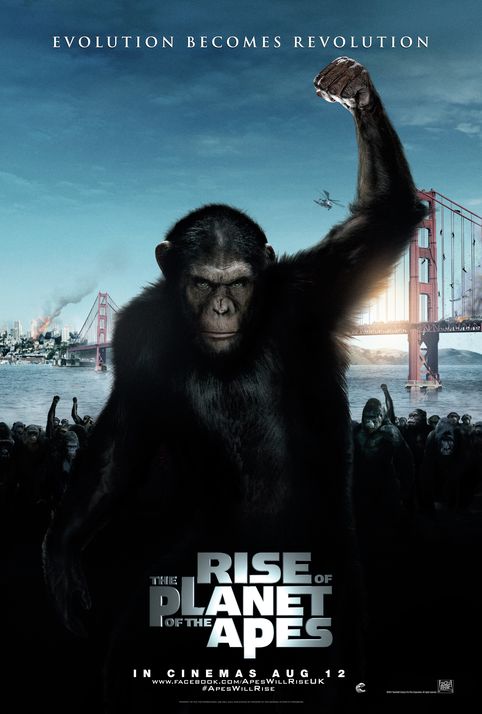Evolution Becomes Revolution
Director
Rupert Wyatt
Starring
Andy Serkis
James Franco
Freida Pinto
John Lithgow
I’ve got to say, 2011 is starting to feel a lot like 1999; we’re just over half-way through the year and we’ve already had a wealth of successful cinematic releases. The law of averages can be interpreted to state that with all these dire remakes and reboots, you’re going to stumble across a handful that actually work. I never would have assumed that a revisit of Planet Of The Apes would produce anything other than mediocre dross – thank you, Burton – but Rise Of The Planet Of The Apes is an incredibly intelligent and emotional tale albeit with a few discernable flaws.
Will Rodman [Franco] is a research scientist working with chimps on an experimental drug which he believes should cure Alzheimer’s. After one particular test subject shows great potential, he takes the formula to the board, in the hope they will approve human trials. Unfortunately, the subject in question, Bright Eyes, behaves erratically before running rampant in the lab and eventually being put down. Will’s boss, Steven Jacobs [David Oyelowo], shuts down the project and orders Will to terminate and dispose of all the chimps; in doing so, it is revealed that Bright Eyes’ behaviour was solely defensive, as she was attempting to protect her newborn infant. With little choice, Will is forced to bring the infant home. Over the following days, Will’s father, Charles [Lithgow], dubs the young ape Caesar [Serkis] and notices a fascinating advanced learning ability, which Will believes was inherited from its mother. Three years pass and Caesar proves to be an exceptionally gifted creature. Unfortunately, Will keeps running into dead ends for trialling his drug and witnessing the deterioration of his father, smuggles out a few vials and administers them to Charles. Another five years pass, Will enters into a relationship with veterinarian chimp expert, Caroline Aranha [Pinto] and despite positive treatment, Charles’ antibodies are now fighting the drug. Following a particularly disorientating episode, Charles is pushed around by his neighbour, Caesar reacts aggressively and Will is forced to send him away to an enclosure for primates. From here on, Will works tirelessly trying to perfect the drug and Caesar has immense difficulty adapting to life with other chimps and the cruel treatment under the facility owners.
**Hinted spoiler in the last few sentences**
Once you take into account this film is more a tale of oppression than smart monkeys running wild, the choice for Rupert Wyatt as director becomes clearer – primarily for the fact that his debut release was a well-received prison break flick. What we have here is a decent story built on a strong emotional base (to ensure audiences empathise with the eventual uprising) and subsequently, under all the glamorous effects, a rather touching tale of independence. Speaking of the visual effects, they are thoroughly impressive and ensuring the only chimps on-screen are CGI was an incredibly smart move – the easiest way to shatter the illusion of your creation is a direct comparison with the real thing. The other technical aspects are equally noteworthy, from Patrick Doyle’s evocative score to the keen camera work and overall direction. There has been a great deal of online bitching since the film’s release in the States, complaining that we don’t see apes taking over the world and fighting some epic global battle but we don’t really need that. By creating characters that don’t kill unreservedly and implying that mankind will wipe themselves out accidentally seems more fitting than the ‘epic war’ scenario perpetuated throughout the originals.
From the outset, it is evident that this story hinges on the success of the ape element.. and succeed it does, exceptionally well. Serkis’ performance and the immersive computer-generated imagery are highly praiseworthy but with such a strong focus on the oppressive treatment of Caesar and his fellow apes, the human side of the story quickly falls away. What starts off as a series of diverse supports for the development of the Caesar character, quickly degenerate into stereotypical filler: the relationship between Will and Caroline seemingly goes nowhere, Jacobs abandons all commendable attributes after the pursuit of money and the jerk neighbour continues to be a jerk. Adding to the lack of the human character exploration, we are supposed to believe that a.) the events that take place on-screen span eight years but not one character appears to age a single day and b.) despite being around Caesar for five years, not to mention being a certified primate expert and enthusiast, Caroline never realises that Caesar is genetically altered – really? Other than that there are a few arguable science fiction plot-holes that can be neatly explained with ‘exposure to the virus would have caused that’, so it’s probably best not to delve too deeply into semantics.
I think Rise Of The Planet Of The Apes is an incredible film and WETA have produced a series of fine visual effects but there are so many tiny issues that really need to be addressed. While I agree that it’s a beautifully told story plastered with glorious visuals, if you remove these elements, you still have sloppy pacing, plot holes and formulaic character types – and for that I can’t award it any higher than an eight out of ten.
Release Date:
12th August 2011
The Scene To Look Out For:
**Colossal spoilers**
As the film progresses, you can’t really help but look out for the various nods and homages to the original Planet Of The Apes films. But due to the way the story handles the evolution of Caesar, there is one scene in particular that will genuinely take most by surprise. Challenging Dodge’s beating, Caesar reaches out and grips his oppressor’s arm, neatly leading into the classic (and expected) “stinkin’ paws off me” line before Caesar lets out a guttural cry, clearly audible as “No!” We all knew it was coming, eventually one of the apes was going to have to say something; heightened intelligence, puzzle solving and sign language are all fine but the story needed that little push into the realm of plausible science fiction. And not only was it brilliantly handled, it was neither milked nor exploited, making for a truly memorable scene – hence the highlighted quote below.
Notable Characters:
Obviously, it goes without saying that Serkis has done an exceptional job and I doubt anyone would imply otherwise. But one easily overlooked performance is that of John Lithgow. Having been absent from mainstream cinema for some time, Lithgow’s tender, subtle performance is quietly powerful without striding into exploitative territory. Oh, and Maurice the orang-utan.. yeah, he was great.
Highlighted Quote:
“No!”
In A Few Words:
“A disappointing human element lets down what could have easily been labelled one of the finest prequels ever filmed”
Total Score: 4/5

![The Red Right Hand Movie Reviews [Matthew Stogdon]](https://reviews.theredrighthand.co.uk/wp-content/uploads/2021/12/cropped-header1.png)



